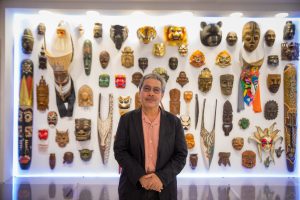Staff Page
Santasombat, Yos

- Research Departments・Position
- Social Coexistence
Visiting Research Scholar - Area
- Southeast Asia borderlands, China’s Belt and Road Initiative (BRI), biodiversity, ethnicity
- Research Interests / Keywords
- Chinese Capitalism, Belt and Road Initiative and its impact on Southeast Asia
- Contact
- santasombat@yahoo.com
Santasombat, Yos
Overview
Chinese Capitalism in Southeast Asia
Over the past ten years, I have coordinated a team of international researchers and carried out four research projects on the expanding role of China in Southeast Asia. The first project is a contemporary analysis of the Impact of China’s Rise on the Mekong Region (Palgrave Macmillan, 2015). The second project focuses on the history and evolution of Chinese Capitalism in Southeast Asia (Chinese Capitalism in Southeast Asia: Cultures and Practices, 2017; The Sociology of Chinese Capitalism in Southeast Asia: Challenges and Prospects, 2019). The third project examines contemporary Chinese transnational mobility through ethnographies of mobile Chinese subjects in Malaysia, Singapore, and Thailand, and their interactions with the ethnic Chinese communities in these countries (Transnational Chinese Diaspora in Southeast Asia, Springer 2022). The fourth and ongoing project focuses on the impact of China’s Belt and Road Initiative (BRI) on Southeast Asia.
Through the conceptual lens of State-led Capitalism, Chinese economic statecraft, de-territorialized nationalism, and multipolarity, our research project attempts to assess and analyze the continuing impact of China’s rise on Thailand and ASEAN during a critical period of Southeast Asian history. Our research objectives are (1) to assess the impact of China’s BRI megaprojects in Thailand and Southeast Asian countries with special focus on ethnographic case studies of special economic zones (SEZs) and high-speed train projects, (2) to comparatively examine and critically analyze the risks and benefits stemming from these megaprojects in Thailand and Southeast Asia, and (3) to organize international seminars on the BRI and to discuss policy implications and recommendations for regional development and balance of power.
I would like to use my time at CSEAS to read more widely about the BRI, discuss and learn from distinguished colleagues at the Center, and to synthesize analyses of the impact of China’s BRI on Southeast Asia into a monograph. This work should represent an integrative and ethnographically grounded approach and offer a more holistic understanding of the transformation of China-Southeast Asia relations. I will also work with Dr. Decha Tangseefa, my partner at the CSEAS, in editing a research monograph on China’s BRI in Southeast Asia: Concepts and Methodologies and organizing international workshop(s) and a conference on China’s BRI in Southeast Asia.
Through the conceptual lens of State-led Capitalism, Chinese economic statecraft, de-territorialized nationalism, and multipolarity, our research project attempts to assess and analyze the continuing impact of China’s rise on Thailand and ASEAN during a critical period of Southeast Asian history. Our research objectives are (1) to assess the impact of China’s BRI megaprojects in Thailand and Southeast Asian countries with special focus on ethnographic case studies of special economic zones (SEZs) and high-speed train projects, (2) to comparatively examine and critically analyze the risks and benefits stemming from these megaprojects in Thailand and Southeast Asia, and (3) to organize international seminars on the BRI and to discuss policy implications and recommendations for regional development and balance of power.
I would like to use my time at CSEAS to read more widely about the BRI, discuss and learn from distinguished colleagues at the Center, and to synthesize analyses of the impact of China’s BRI on Southeast Asia into a monograph. This work should represent an integrative and ethnographically grounded approach and offer a more holistic understanding of the transformation of China-Southeast Asia relations. I will also work with Dr. Decha Tangseefa, my partner at the CSEAS, in editing a research monograph on China’s BRI in Southeast Asia: Concepts and Methodologies and organizing international workshop(s) and a conference on China’s BRI in Southeast Asia.
